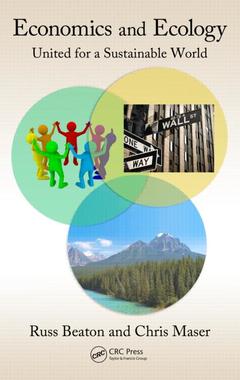Economics and Ecology United for a Sustainable World Social Environmental Sustainability Series
Auteurs : Beaton Charles R., Maser Chris

The earth, our home, is in crisis. There are two sides to this crisis?our global economy, and its effect on the ecology of our home planet. Despite conventional thinking that typical monetary and fiscal manipulations will put us back on the path of economic growth, the reality is not that simple. Meanwhile, the natural environment is sending unmistakable warnings. Glaciers are melting; oceans are becoming dangerously acidic; species and their ecological services are becoming extinct; and weather patterns are becoming increasingly severe and unpredictable each year. The stress on resource systems of all kinds threatens to shrink the carrying capacity of the planet, even as we call upon it for increased contributions to support a burgeoning human population.
Co-written by an ecologist and an economist, Economics and Ecology: United for a Sustainable World counsels the replacement of symptomatic thinking with a systemic worldview that treats the environment and the economy as an ecosystemic unit. The first part of the book establishes the methodological and biophysical principles needed to develop the concept of socioeconomic sustainability. The second part of the book examines the misuse of economics in the service of what increasingly appears to be a ruinous pursuit of material wealth and expansion. The third part offers advice on reconciling economics and ecology by proposing an economics in which the principles employed are aligned with the biophysical principles of ecology.
This timely volume puts forth a sustainable worldview based on systemic thinking, with the emphasis more on what and how people think than on what they do. A unique reference for professionals and laypersons alike, it can also serve as a supplementary classroom text for students of economics, ecology, biology, and environmental science.
Introduction. SETTING THE STAGE: Methodological Overview. Energy—The Critical Resource. ECONOMICS IN THEORY AND PRACTICE: The Innate Nature of Economics. Consumption Theory. Production. Externalities. Distribution. Macroeconomics – Is It Still Helpful in an Age of Scarcity? RECONCILIATION AND LOOKING TO THE FUTURE: The Meaning of Social-Environmental Sustainability. Imagining the Ideal World. Counsel for Getting There. Appendix. Index.
Russ Beaton received his bachelor’s degree from Willamette University in Salem, Oregon, and his Master’s and Ph.D. degrees from Claremont University, California. His original training was in mathematical economics and econometrics, although his doctoral thesis was in location theory and urban land economics, which became a lifetime interest.
After teaching for 3 years at California State College at Fullerton (now Fullerton State University), and 4 years at Simon Fraser University in Vancouver, British Columbia, Canada, Beaton returned to his alma mater, Willamette University, where he taught economics and did research for 33 years.
He has consulted and done policy-based contract research for at least six different agencies of the State of Oregon, in areas such as land use, agriculture, timber, transportation, energy, housing, and general economic policy.
Beaton is coauthor with Chris Maser of two other books and participated in drafting the legislation, passed by the 1973 Oregon Legislature, that created Oregon’s widely acclaimed land use planning system.
Chris Maser was trained in zoology and ecology and worked for 25 years as a research scientist in agricultural, coastal, desert, forest, valley grassland, shrub steppe, and subarctic settings in various parts of the world before realizing that science is not designed to answer the vast majority of questions society is asking it to address.
Maser gave up active scientific research in 1987 and has since worked to unify scientific knowledge with social values in helping to create sustainable communities and landscapes, part of which entails his facilitating the resolution of social-environmental conflicts. He has contributed to more than 286 publications, including 34 books, mostly dealing with some aspect of social-environmental sustainability.
Although he has worked and lectured in Canada, Egypt, France, Germany, Japan, Malaysia, Mexico, Nep
Date de parution : 09-2011
15.6x23.4 cm
Disponible chez l'éditeur (délai d'approvisionnement : 15 jours).
Prix indicatif 232,80 €
Ajouter au panierDate de parution : 05-2017
15.6x23.4 cm
Disponible chez l'éditeur (délai d'approvisionnement : 14 jours).
Prix indicatif 93,24 €
Ajouter au panierThèmes d’Economics and Ecology :
Mots-clés :
Corvallis Gazette Times; National Academy; Selective Accountability; Federal Reserve System; Laws of Thermodynamics; Federal Reserve; Inviolate Biophysical Principles; Energy Resources; Over population; Energy Source; Biological Carrying Capacity; Net Energy Analysis; Affluence; Social Environmental Sustainability; Redistribution; Triple Bottom Line Framework; Informed Denial; Black Man’s Land; Keynesian Solution; International Monetary Fund; Economic Pennanence; Imperfect Property Rights; Ecological Integrity; Biophysical Principles; Social Equity; Capitalist Scenario; Sustainability; Triple Bottom Line; Federal Government; Living Trust; Globalization; Mill Foreman; Centralization; Throughput Model; Ancient DNA; Freshwater Turtles; Snowshoe Hares; Private Property Market Economy; Night Watchman; Innate Reliance; Complex System Theory



